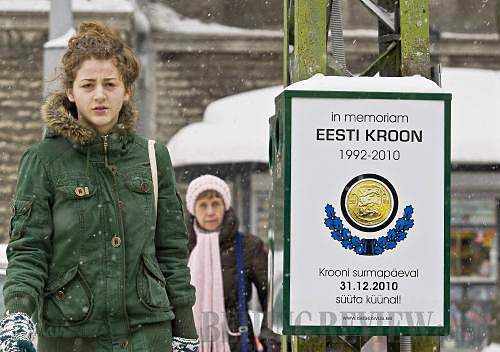|
 |
|
END OF AN ERA: A woman walks by a poster commemorating the end of Estonia's currency in Tallinn on December 30, 2010 (XINHUA) |
Estonia's currency board system was designed by Steve H. Hanke, a professor of the Johns Hopkins University. Hanke insisted Estonia's priority was to enhance competitiveness rather than joining the euro zone.
But Estonian Prime Minister Andrus Ansip said foreign exchange transaction costs could be reduced by joining the euro zone. Foreign investors' anxiety about the devaluation of the kroon can also be mitigated. In this way, Estonia will be able to attract more foreign investment. Ansip said joining the euro zone is the Estonian Government's biggest achievement. He said it would not only create more job opportunities, but also speed up Estonia's economic development.
Replacing a currency is a big issue, involving every individual and every company.
Beginning on New Year's Day 2011, the Estonian people started to change their money from the kroon to the euro, at an exchange rate of 15.6466-1. The government is worried that some shops and companies may use this opportunity to raise prices. An opinion poll showed 80 percent of respondents believed prices might increase dramatically after adopting the euro.
To combat this problem, the Estonian Chamber of Commerce and Industry, along with the Consumer Protection Board, launched a fair pricing agreement in August 2010. Companies signing the agreement promised not to take advantage of the currency change to raise prices. By September, 450 companies had signed the agreement, but many stores are still taking a wait-and-see approach.
In addition to concerns about price increases, some Estonians are finding it difficult to accept the abandonment of the kroon, which had been used for nearly 20 years. Ansip himself also said the picture on the euro was not as beautiful as that on the kroon.
Future direction
Since the birth of the euro in 1999, some people have predicted its eventual collapse. This worry seems groundless, however, since European countries could not bear the huge political problems such a collapse would cause.
Many European politicians have said that without the euro, there would be no EU, and without the EU, there would be no European integration. Therefore, to defend the achievements of more than half a century of European integration, Europeans will defend the euro at all costs.
The economic costs of abandoning the euro are also huge. Since the birth of the euro, trade transaction costs have declined dramatically, long-term interest rates have stayed at a low level and prices have remained stable. Every European has benefited from this move.
Indeed, Estonia is a small country with a population of only 1.34 million and a GDP of less than $20 billion. Such a small country seems unlikely to affect the future policies of the euro zone. However, despite economic difficulties fueled by crises in Greece and Ireland, leaders of euro zone member states still agreed to accept Estonia's entry. This bears great political significance and also presents the charm of the euro.
The author is deputy director of the Institute of European Studies of the Chinese Academy of Social Sciences | 